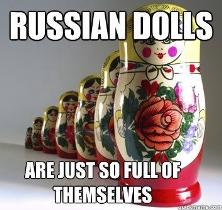Does Being Russian Mean Never Having to Say You’re Sorry?
This was just the opposite of the linguistic statement we had been discussing the day before: Here were people deliberately claiming the right to represent their country, though their views were clearly different from those of the majority and the government. This, too, is a Russian rhetorical tradition: It dates back to the 19th-century intelligentsia, who used the slogan “For our freedom and yours” to protest the Russian Empire’s war on Poland, which was later picked up by Soviet dissidents opposing the Soviet invasion of Czechoslovakia.
When dissidents claim the right to speak as citizens of their country, the backlash is usually immediate and painful. The week after the downing of MH17, the Russian opposition newspaper Novaya Gazeta published a cover that said, in Dutch, “Vergeef ons, Nederland” (Forgive us, the Netherlands) and received so many contradictory online comments that the editors published a compilation as a separate item on the website.
Many Dutch citizens thanked the paper for its stance. But most Russian-language readers commenting on the cover were furious. “What basis do you have to ask Holland for forgiveness, which suggests that the Russian Federation is responsible for the crash?” was one typical reaction. “You are libeling the Russian Federation and claiming to speak for everybody!”
I was surprised that some of the backlash came from Russians now living in the Netherlands; they seemed particularly upset at the idea that responsibility for the disaster could be shared by all Russians. “Who asked you?” wrote one such woman. “What else are you going to ask forgiveness for?”
One could suggest a few more things to apologize for, and several more countries to ask for forgiveness, but as my reporting trip continued I, for one, stopped feeling responsible for Russia.
In the city of Volgograd, the site of the Battle of Stalingrad and a future host city of the 2018 World Cup, I entered the souvenir shop at the airport. It featured plates and mugs with renderings of Joseph Stalin and Vladimir Putin, as well as Stalin and Putin nesting dolls. I took pictures of the wares and chatted with the saleslady so she would help me identify the dead Soviet leaders whose tiny wooden likenesses were tucked inside the two dictators, dead and alive. And then I realized that I no longer felt the emotion I had come to experience all too often before I finally left Russia seven months ago: burning shame. I felt like an observer rather than a participant in Russia’s continuing slide into darkness.
Of course, it helps that when I cross the border out of my motherland, I put my red Russian passport away and use my blue U.S. passport for the rest of the journey, wherever I am going. If I did not have this option, I might feel compelled to do what a woman reportedly did last week when she handed her Russian passport to a border-control officer in Paris: She inserted a note that said, “I’m sorry for our president. I didn’t vote for him.”
Masha Gessen
Masha Gessen is the author, most recently, of “Words Will Break Cement: The Passion of Pussy Riot.”

